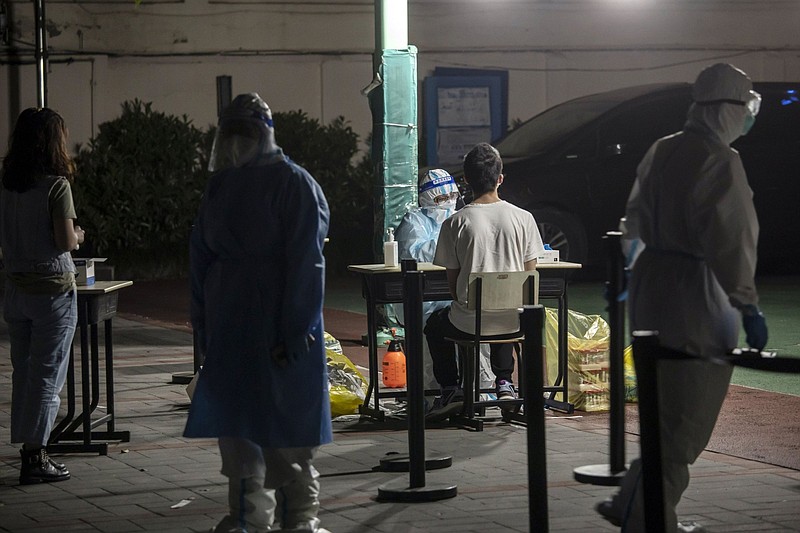China's lockdowns to contain the country's worst covid outbreak since early 2020 have battered the economy, stalling production in major cities like Shanghai, and halting spending by millions of people shut in their homes.
The restrictions are intended to eradicate any trace of the virus in the community, but they've also pressured everything from manufacturing and trade to inflation and food prices.
Premier Li Keqiang has repeatedly warned of risks to economic growth, telling local authorities earlier this week they should "add a sense of urgency" when implementing existing policies. The government is holding firm to its Covid Zero approach for now, a strategy economists say will push growth down to 5% this year, below the official target of around 5.5%.
Here's a deeper look at how the lockdowns are impacting critical sectors across the world's second-largest economy.
• Commodities hit. China posted sluggish commodities imports in March, as elevated prices due to the war in Ukraine and tightening virus restrictions took their toll on demand.
Natural gas purchases were worst affected, dropping below 8 million tons to their lowest level since October 2020. Crude and coal purchases were also running well behind last year's schedule.
Chinese demand for jet fuel is projected to drop by 25,000 barrels per day from a year earlier, a 3.5% fall, according to the International Energy Agency. The IEA previously expected 10,000 barrels per day of growth. The number of daily flights in China, as averaged over seven days, has fallen below the lowest level seen in 2020, with less than 2,700 active flights on Tuesday, according to Airportia, a real-time flight tracker.
China's domestic metals fabricators are facing hurdles to transport raw materials and finished products, which have led to output cuts. Six out of twelve copper-rod plants in Shanghai's neighboring provinces surveyed by Shanghai Metals Market earlier said they either have halted or plan to halt output. The researcher also predicted a rise in aluminum inventories.
Meanwhile, Chinese buyers have slashed liquefied natural gas purchases in the world's biggest LNG importer as prices soar and domestic demand stalls. Imports in the first quarter fell 14% from the same period last year, according to shipping data, and private companies are spurning offers to use once-highly coveted slots at state-owned receiving terminals.
• Port congestion. Shanghai's city-wide lockdown has created congestion at the world's largest port, with queues of vessels building there and at other stops handling diverted shipments. The number of container ships waiting off Shanghai as of April 11 was 15% higher than a month earlier, according to Bloomberg shipping data.
A shortage of port workers in Shanghai is slowing the delivery of documentation needed for ships to unload cargoes, according to ship owners and traders. Meanwhile, vessels carrying metals like copper and iron ore are left stranded offshore as trucks are unable to send goods from the port to processing mills, they said.
Data on Wednesday also showed the lockdowns having a notable impact on imports, which fell 0.1% on year in March, the first contraction since August 2020.
• Manufacturing woes. China's purchasing managers surveys show manufacturing contracted in March, with small and medium-sized firms particularly shaken by operational snags. The Caixin index, based on surveys of smaller, export-oriented businesses, dropped to its worst level since the start of the pandemic two years ago.
Some large manufacturing firms have been able to keep operations going by adopting a so-called closed loop system, in which employees were kept at factory locations and tested regularly. However, those protocols aren't perfect: One member of a European Union trade group said earlier this month that work can be "very, very difficult," even with permission to operate amid restrictions.
• Tech disrupted. Some technology companies have suspended production as China's restrictive policies weigh on a sector already contending with a shortage of components.
Most major tech manufacturers -- from Semiconductor Manufacturing International Corp. to Taiwan Semiconductor Manufacturing Co. and iPhone maker Foxconn Technology Group -- froze operations in the early days of Shanghai's outbreak. Many have since resumed after setting up closed-loop systems.
As of Wednesday, more than than 30 Taiwanese companies including Pegatron Corp. and Macbook maker Quanta Computer Inc. had halted production in eastern China's electronics hubs because of Covid rules.
Logistics jams are constricting shipments of components, draining inventories to the point where some manufacturers including Pegatron, Wistron Corp. and Compal Electronics Inc. are down to just a few weeks' stocks, consultancy Trendforce estimates. The ongoing global supply crunch could worsen if local manufacturing is disrupted, constraining stock of computers and gaming consoles to smartphones, servers and electric vehicles.
-- Information for this article was contributed by Lin Zhu, Fran Wang, Ann Koh, Kevin Varley, Chunying Zhang, Peter Vercoe, Jessica Zhou, Jason Rogers, Sharon Cho, Sherry Su, Alfred Cang and James Mayger of Bloomberg News.
